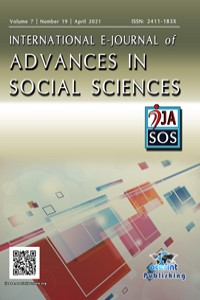Abstract
References
- Aminova, A.A. (1988). Verb synonyms of the Russian language (in Russian).
- Efremova, T.F. (2006). Modern explanatory dictionary of the Russian language (in Russian).
DIACHRONIC APPROACH TO STUDYING WORD FORMATION SYNONYMY (ON THE EXAMPLE OF VERBS OF THE LEXICO-SEMANTIC GROUP "VERBS OF PLACING AN OBJECT ANYWHERE AS A RESULT OF A CERTAIN ACTION")
Abstract
This study is devoted to the consideration of the processes of the emergence and destruction of synonymy in the diachronic aspect between languages of units of two levels - lexical and educational. Moreover, both levels are interconnected and interdependent, since changes in one of them are necessarily on the other. An important role is given to the value of the context in the processes under study. Recognizing the symbolic nature of the language as an exponent of the linguistic picture of the world of its speakers, the authors analyze the reasons for the convergence and divergence of meanings at different time intervals of both the same word and the same root different affix lexemes. The material for the study was the verbs of the lexico-semantic group «Verbs of placing an object anywhere as a result of a certain action», taken in the same context from the lists of the biographies of the Russian saints Boris and Gleb, created at different times and subsequently translated from Old Russian into modern Russian tongue. The main criterion for the selection of linguistic material was the principle of interchangeability of lexemes in the same contexts, since in relation to diachronic synonymy it is fundamental and objectively reflects the linguistic situation of the linguistic period under consideration. In the course of the study, the authors come to the conclusion that the development of synonymous relations between the analyzed verbs «обертеть», «увертеть» and «ввертеть» influenced by the grammatical characteristics of lexemes and their lexical meaning associated with contextual use. And the frequency or singularity of their use is associated not only and not so much with the dictionary meaning, but with the genre of the text in which this or that verb is used.
References
- Aminova, A.A. (1988). Verb synonyms of the Russian language (in Russian).
- Efremova, T.F. (2006). Modern explanatory dictionary of the Russian language (in Russian).
Details
| Primary Language | English |
|---|---|
| Journal Section | Research Article |
| Authors | |
| Publication Date | May 7, 2021 |
| Submission Date | February 2, 2021 |
| Published in Issue | Year 2021 Volume: 7 Issue: 19 |
Cite
Contact: ijasosjournal@hotmail.com
The IJASOS Journal's site and its metadata are licensed under CC BY
Published and Sponsored by OCERINT International © 2015- 2025

